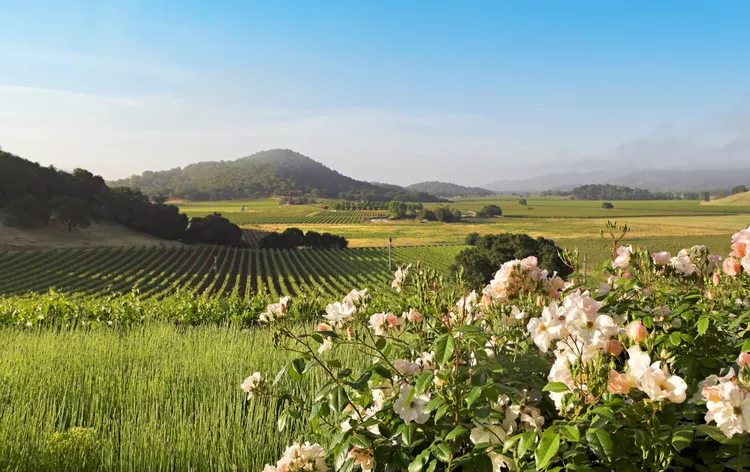Explore Spring in Napa Valley
Forget that “first day of spring” that shows up on your calendar in March. In Napa Valley, the season starts in February and lasts through May.
Weather can be variable during this time of year. In a wet season, you might encounter rain; however, most tasting experiences are indoors and won’t hinder your enjoyment.
Spring Vine Growth: In spring, new shoots emerge from the dormant vines, with growth rates reaching up to 1.5 inches per day. Closely observing the vines, you’ll notice tiny clusters of grapes beginning to form. The date when these appear is referred to as “bud break,” providing an initial hint of when the grapes will be ready for harvest.
The most visually stunning aspect of spring in Napa is the bright yellow mustard blooms, which appear before the vines are leafed out. In peak years, it’s an extraordinary sight, carpeting the landscape with yellow blossoms, often shared on social media with tags like #mustardflowers and #napainspring.
Spring Weather in Napa Valley
Typically, daytime highs range from the 60s to 70s °F, with nighttime lows from the mid-40s to mid-50s. February is recognized as Napa’s wettest month, while March still experiences significant precipitation.
Due to varying conditions, checking the short-range forecast before visiting is crucial. You can never predict when an unseasonable heatwave, cold snap, or rainstorm may occur.
What to Pack
When packing for your trip, consider light layers and a jacket, particularly for evenings when temperatures may drop unexpectedly. Always check for rain in the forecast and consider taking an umbrella or raincoat if necessary.
Casual attire dominates Napa’s atmosphere. While upscale dining options like the French Laundry have a dress code requiring men to wear jackets (ties optional), most venues welcome stylish casual wear. When in doubt, calling ahead is advisable.
If you plan to visit winery caves, be aware that the underground temperature is around 58 °F (14.5 °C). While this temperature is optimal for aging wine, it might feel chilly if you aren’t adequately dressed. For winery tours involving vineyard walks, bring comfortable shoes suitable for uneven, bare ground.
Spring Events in Napa Valley
Unfortunately, the Napa Valley Mustard Festival, once a beloved spring event, has been discontinued due to economic pressures. Nevertheless, the bright mustard blooms continue to enhance the beautiful landscapes.
- The Napa Valley Marathon occurs in March. Even if you’re not participating, it’s important to note that this event affects traffic along Silverado Trail from the town of Napa to Calistoga.
- The BottleRock music festival has gained immense popularity, leading to hotels and rentals near Napa Valley being fully booked as soon as tickets go on sale. BottleRock typically takes place in late May and may coincide with Memorial Day Weekend. Check this year’s date on their website.
- Several wineries also feature beautiful lavender gardens, such as Ceago, located north of Napa in Clear Lake.
Spring Travel Tips
- Napa can become quite crowded on weekends and holidays, especially around Valentine’s Day and Easter.
- Visiting on a weekday offers a significantly quieter experience, allowing for more personal attention from tasting room staff.
- If rain is in the forecast or has recently fallen, consider avoiding winery tours that involve walking through muddy vineyards.
- Traveling by air with wine? Remember, TSA regulations prohibit bringing liquid over 3.4 ounces through security. If you plan to pack wine in checked luggage, wrap the bottles in bubble wrap to prevent breakage, and use plastic bags and tape to contain any spills.




